Michigan's Silverdome Faces Uncertain Future As Decay Sets In
By Pablo Iglesias Maurer in News on Jun 15, 2015 6:35PM
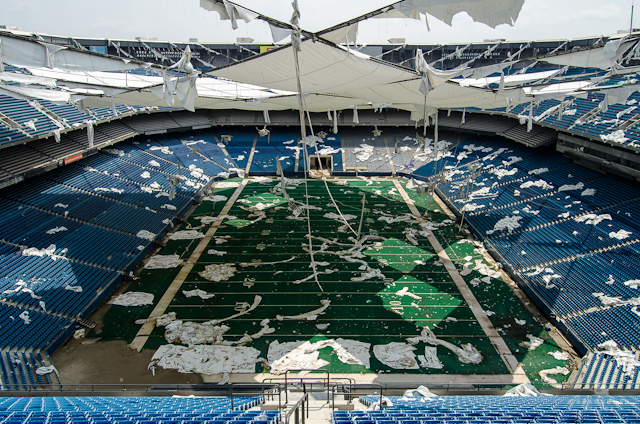
Photo by Pablo Iglesias Maurer.
Pontiac, Michigan's Silverdome once hosted The Who, Elvis, Led Zeppelin, WrestleMania III and the Pope, and packed tens of thousands of fans at a time between its stadium walls. But now that the iconic architectural marvel has fallen on hard times, it's become a symbol of the Detroit-area's ongoing decay.
Earlier today, the latest installment of DCist's Abandoned States series explored what's left of the Silverdome in Pontiac, Michigan. The 80,000 seat arena, built in the mid '70s, has fallen into disrepair after a storm tore apart its iconic fiberglass dome in 2012.
DCist's Pablo Maurer shared with Chicagoist his interview with real estate investor Peter Apostolopoulos of Toronto-based Triple Investment Group LLC—which has owned the facility since 2009—to shed some light on its current condition and what the future may hold for it.
Pablo Maurer: We've read the Silverdome is up for sale, at an asking price of a [flexible] $30 million. I'm wondering what efforts you (and Triple) have made in the past couple of years to consider re-developing the site and how you concluded that it'd be a wiser investment to sell the place. I know that wasn't your original intention, what's changed?
Peter Apostolopoulos, Triple Investment Group: We aren’t selling the stadium—it’s [up] for sale, or lease, or redevelopment, or co-development partnership. Flexible means just that, we're flexible. We’re open to many ideas and need to put the word out that we are interested in all opportunities.
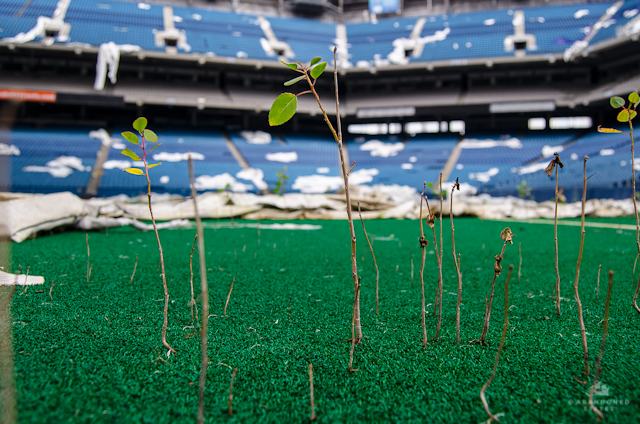
Photo by Pablo Iglesias Maurer
This is no different than erecting new building and putting a sign in front of it or [developing] an empty piece of land [and] having a sign out front advertising that its owners are looking for options.
Not everyone can be happy with decisions that are made in communities that have hit hard times and that need to find ways out of a tough spot. Pontiac was one of those cities that was unfortunately in that position. The decision to sell the stadium was made by the people put in place that were hired to do what they had to in order to relieve the city of some serious annual costs that the city just didn’t have the money for.
Many people remember—but seemingly not everyone—that after literally millions of dollars were re-invested into the stadium by Triple Properties to bring it back to life, many events were held there: monster truck shows, snow cross races, concerts, trade shows, film shoots, boxing, soccer… the list was rather incredible considering the Stadium was literally empty for eight years prior to Triple Properties' purchase.
We decided to take a chance and try to bring the Silverdome back to life and do all the things that stadiums of that size can do. Unfortunately the truth is the stadium wasn’t what had changed… but the world around it had. No longer are there acts that can fill up 83,000 seats or sporting events on a regular basis. People are looking for more intimate settings.
Even trying to bring a major league soccer team there was held up by the sheer volume of seats inside the stadium.The dynamics of these things are what dictate the future of places like the Silverdome, and it’s no one person or company’s fault, these things are just the facts of life. Things change, rather simple if you ask me.
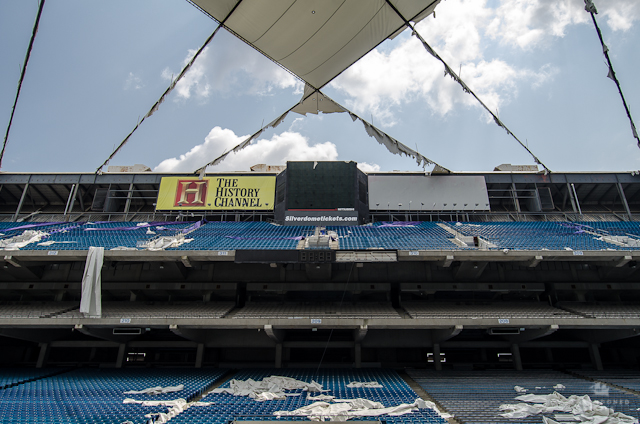
Photo by Pablo Iglesias Maurer
Maurer: A lot has been made of the kind of shape the stadium itself is in. What's your assessment of the structure and its potential for re-use (even if the end buyer decides to raze it.) Has it been portrayed unfairly?
Apostolopoulos: Yes, we believe it has been portrayed unfairly. Imagine a rather empty room. Now imagine ripping up a pillow and allowing all the feathers to be strewn across that room. It would look like a disaster hit, but that doesn’t mean the room is unsafe. There is no doubt that perception is a rather powerful interpretation of the condition of things, but it's not always the reality.
Aside from the dome top, the exterior of the building hasn’t changed much since its inception. Even if you Google Street View the property and go back to the earliest time photos are available (2008, before we purchased the property) it slowly but progressively got better. But for the most part it pretty much looks the same, with one exception; last year we pulled permits to plant—and we did—over 120 trees on both Opdyke and Featherstone Road as well as laying down new sod and erecting new parking lot lights.
The exterior actually looks cleaner and in better condition now then it has in the past few years because of it. So to call it an eyesore…..then it must have always been an eyesore. The one thing about the stadium that many people may not know, is that it was actually built to outdoor specifications, both for weather and temperatures, structurally it's sound and safe. If it were to reopen to the public then yes, it would obviously need to be tidied up and certain things would need to be done, but it’s not open to the public right now. There is always a potential for re-use but for now we are still trying to find the right use, and that takes time.
Maurer: Is it your hope that the stadium itself can be saved in some way, if that's even possible?
Apostolopoulos: Our hope is that the economic growth of Pontiac and Oakland County continue to grow, and that everyone can be prosperous in the coming years. If the stadium can be saved, then that would be wonderful. Anything is possible, but like I mentioned earlier, the reality is times have changed and an 83,000 seat stadium is jus not economically feasible.
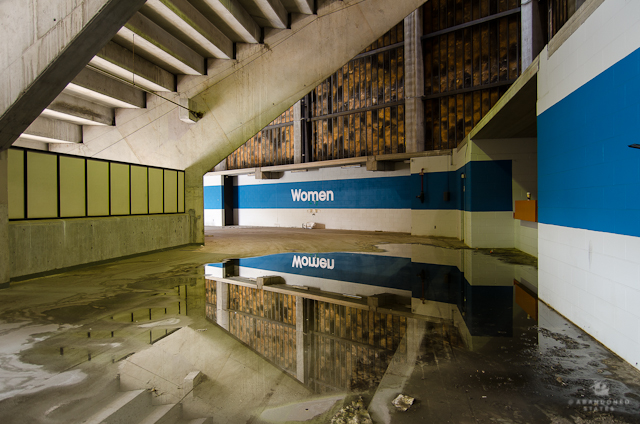
Photo by Pablo Iglesias Maurer
Maurer: There are certainly some that would say that your corporation purchased the place only to let it go to waste and flip it. I've seen Triple described as an "absentee landlord” by certain members of the community and press. What's your response to that perception?
Apostolopoulos: It is a harsh one and you can’t please everyone. In the end you always have to do what’s right for yourself as an individual and your company. People are entitled to their opinions, and there is nothing wrong with anyone speaking their mind for the betterment of their community, but there always has to be give-and-take and understanding when someone is trying to make something out of nothing.
We weren’t the only ones to have had a chance to make an offer on the Silverdome, we found out about the auction from reading it in a Toronto newspaper. It would be safe to say then that a lot of people knew it was available well before we did, and they passed up on the opportunity.
We followed the auction rules and submitted our bid and won. We purchased the property as an investment and then we took a chance on the stadium by investing millions of dollars to bring it back to life. We did that. Albeit it was a brief period, but we still did it.
We knew it was a chance going in, and no one else was willing to take the same chances we did. It’s easy to tell someone else how to do things like spend their money, and even easier to complain about it, but the truth is there are a lot of blighted properties in Pontiac that don’t have 24-hour security, that don’t have lights or well kept grass and don’t pay property taxes—the Silverdome isn’t one of them.
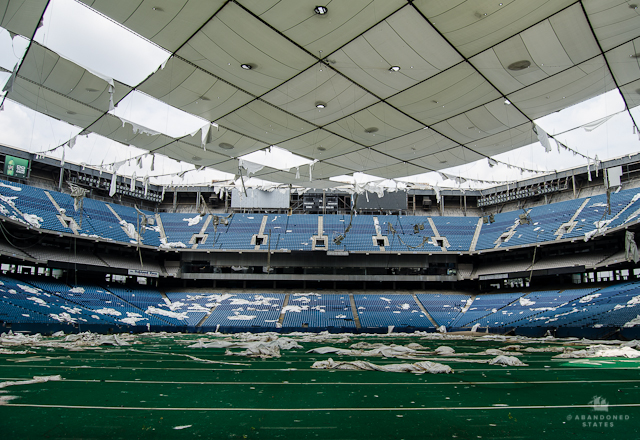
Photo by Pablo Iglesias Maurer